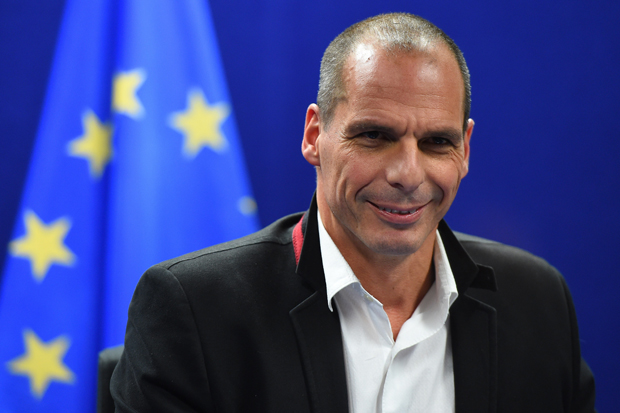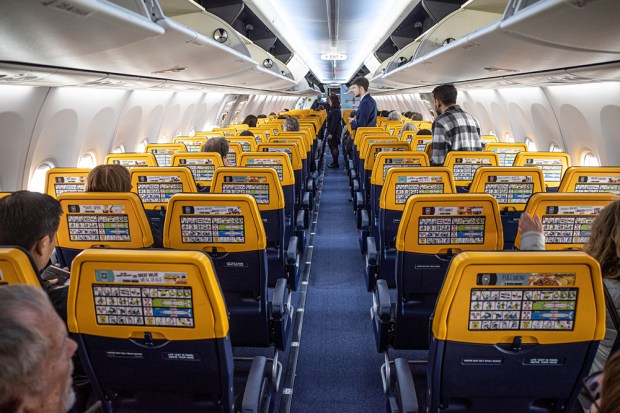Bored with the election? Switch over to the Greek debt drama. In this week’s cliffhanger, silver-tongued finance minister Yanis Varoufakis visited IMF chief Christine Lagarde on Sunday, promised to meet his country’s obligations ‘ad infinitum’, and was expected to meet a €450 million repayment to the IMF on Thursday. But more troublesome members of the ruling Syriza party denounced the IMF and Brussels for treating Greece as ‘a colony’, threatening a snap election ‘if creditors insist on an inflexible line’, and warning that public-sector salaries and social security payments must rank ahead of debt as cash runs out.
Which it will before August. Greece’s tax collections are so feeble, its ability to re-finance maturing public debt so perilous, its commitment to reform so unconvincing and outflows of funds from its banks so torrential that the likelihood of avoiding default — and possibly chaotic exit from the euro — is rapidly vanishing. Even if a last tranche of bailout money is finally released, relief will only be temporary. If the crisis doesn’t arrive when the next IMF instalment (€771 million) falls due on 12 May, it must surely come when more than €2 billion is demanded between 5 June and 13 July. That danger period could coincide with our own market turmoil following a Miliband-Sturgeon pact to ‘lock David Cameron out of Downing Street’. The two dramas will intertwine, and we’ll be watching disaster on every channel.
Meanwhile, prime minister Alexis Tsipras was in Moscow to meet Vladimir Putin, supposedly to discuss easing restrictions on Russian imports of Greek produce imposed in response to EU sanctions on Russia for its actions in Ukraine — but also to remind western powers that other allegiances are possible. So far there’s no suggestion of Russian financial support for Syriza — but Putin could at least offer Tsipras a parable of how to be a responsible international borrower even when the world seems to be against you. At the height of Ukrainian tensions last year, and despite grave doubts across the art world, the British Museum lent the Hermitage in St Petersburg a statue of the river-god Illissos — and in February this year, the Russians returned it, on time and intact. But Putin might also mischievously remind his visitor that the statue is part of the Elgin Marbles, removed from the Parthenon — and that the last place on earth Illissos is ever likely to be sent on loan is Greece.
Dream boats
Wouldn’t it be great to cash in that low-yielding pension, as George Osborne has invited over-55s to do, and buy a yacht instead? Sailing with friends off Puerto Andratx in Majorca on Easter Sunday, eight knots under a cloudless sky, I thought to myself — in the fashionable phrase — hell, yes! Reading early reports (before sceptics cast doubt on the veracity of the story) of American sailor Louis Jordan’s ordeal clinging to an upturned hull 200 miles off North Carolina, I thought: hell, no.
Live the dream if you have the inclination, I concluded, but plot your tax position before you leave harbour and always carry a survival pack — preferably in the form of sufficient equity in bricks and mortar to keep you in old age, after your dream boat has capsized. Louis Jordan looked quite improbably well for a man who claimed to have survived 66 days on rainwater and raw fish, but I wouldn’t want to try it.
A political journey
‘Nice office,’ I said to a friend who runs a business in St James’s Square. ‘You should see the one through there,’ he pointed to vast mahogany doors. ‘Absolutely palatial. Used to be Allen Sheppard’s.’ Lord Sheppard, who died last month, was chairman of food-and-drink giant Grand Met, now part of Diageo: a fascinating aspect of his story was his journey from working-class Labour warrior to Thatcherite grandee with all the trappings. What changed him was the failure of socialism in the 1970s: the zeal of the convert was evident in a letter he wrote to the national press, heading a list of business leaders, before the 1992 election. ‘There is evidence all around us of this new spirit… dramatic improvements in productivity and renewed emphasis on innovation and skills… growing employee involvement… substantial inward investment by our trading partners expressing their confidence in our hospitable business climate…’. It was a more passionate and persuasive text than last week’s short effort from business leaders of 2015 — but I guess the case for free enterprise was more vivid when the memory of the alternative was still raw.
Femme fatale
When I watch Nicola Sturgeon exercising her newfound charm and confidence, I experience a pang of intimate regret. Some 15 years ago — when she was a new MSP and the SNP’s shadow education minister — we both appeared on a late-night Scottish television show in Aberdeen, in which guests were invited to defend controversial propositions in front of a live audience of students. My task was to argue that poorer countries should not have their debts forgiven (then the theme of the Millennium ‘Jubilee’ movement, now a key argument about Greece) as a result of misplaced rich-world guilt; needless to say I took a pasting. The future first minister made a worthy but jokeless case for teaching Gaelic in primary schools, and provoked a lot less shouting.
Afterwards we drank with the production team at the hotel where we were all staying. Well after midnight, the bedside phone rang in my room and I answered it. Silence, then a Scottish male voice growled, ‘Is Nicola there?’ My regret is not that Nicola had barely directed a word or glance in my direction all evening, but that the response I made to the unknown caller was ‘Wrong room, pal’, and not one of several hilarious alternatives that occurred to me over the following few days. I think my favourite was: ‘Can she call you back in the morning? We’ve lost the key to the handcuffs.’
Got something to add? Join the discussion and comment below.
Get 10 issues for just $10
Subscribe to The Spectator Australia today for the next 10 magazine issues, plus full online access, for just $10.
You might disagree with half of it, but you’ll enjoy reading all of it. Try your first month for free, then just $2 a week for the remainder of your first year.















Comments
Don't miss out
Join the conversation with other Spectator Australia readers. Subscribe to leave a comment.
SUBSCRIBEAlready a subscriber? Log in